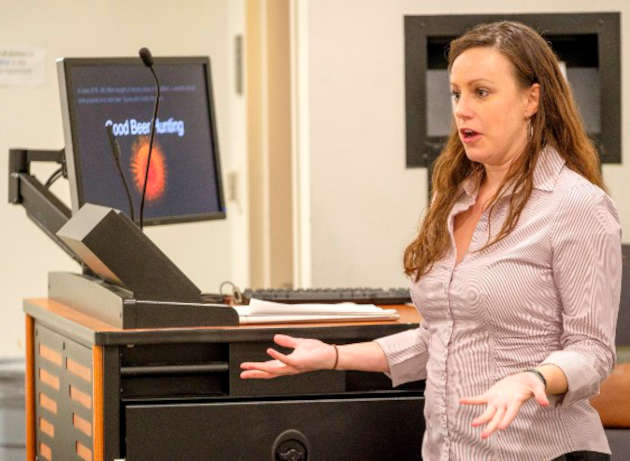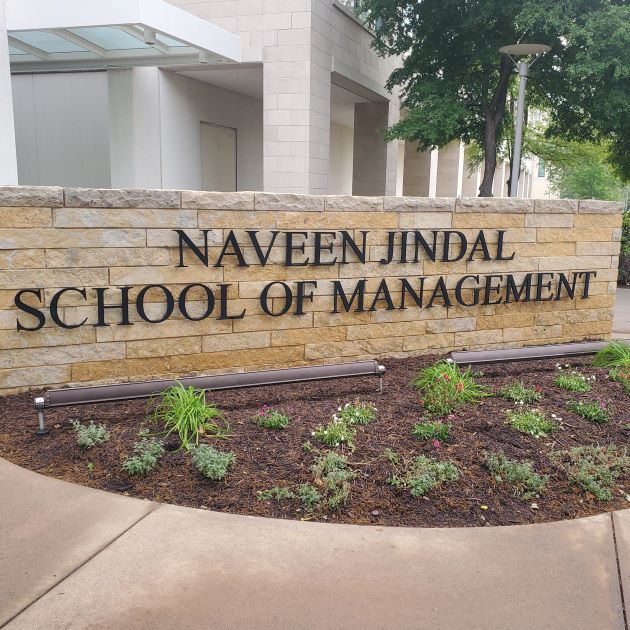
On a recent Tuesday evening, students in a new course, “The Craft Brewing Industry in Texas,” studiously watched a TV ad that mocked the very subject they were learning about.
“Let them sip their Pumpkin Peach Ale,” said the Budweiser ad. “Our beer is brewed for drinking, not dissecting.”
Bud might still be the “king of beers,” but the craft brewing revolution is challenging that throne, contributing $4.9 billion to the Texas economy alone last year, according to Dr. Richard Harrison, an associate professor in the Naveen Jindal School of Management who created the class.
Harrison’s course took a timely look at one of the fastest-emerging areas of local business, said Tiney Ricciardi, craft beer journalist at The Dallas Morning News.
“People see opportunity in local beer,” said Ricciardi, guest speaker in a class session that focused on how the media covers craft brewing. “I think Professor Harrison’s class is really encouraging … it’s a sign that the North Texas beer industry is being taken seriously.”
Harrison, a self-described craft beer enthusiast, got the idea for the course after reading research from colleagues at Stanford University on “resource partitioning theory” and craft beer: As big corporate brewers consolidated, it created space in the 1980s and beyond for small brewers to pop up and sell a wide variety of stouts, lagers and India pale ales.
The craft beer boom was slow to hit North Texas, but when it did, it hit hard. Five years ago, there were only five craft breweries in the area. Today, there are 60, and they employ “probably less than 1,000 workers,” Harrison said. But, he added, if you include beer distributors, workers in craft beer bars — all the employees upstream and downstream, the industry accounts for thousands of local jobs.
“It’s come a long way from home-brewing in the garage,” he said.
The 20 students in Harrison’s class didn’t drink beer as part of the course. Instead, they dissected every aspect of the craft brewing business, from financing and production to cutting through the thicket of regulations you need to pass before you can sell a single pint of lager.
“There are a lot of hurdles breweries have to go through,” Harrison said. “It’s a long, elaborate process.”
Speakers at the class included a representative from the Texas Alcoholic Beverage Commission, two reps of major beer distributors, and six local craft brewery owners. The owners included three UT Dallas graduates: Michael Peticolas, BA 1995, of Peticolas Brewing Company; Joel Malone, JSOM BS 2008, MBA 2011 and MS 2011, of Bishop Cider Company; and David Wedemeier, JSOM BS 2002 and MBA 2005, of Martin House Brewing Company.
“Listening to all these different local industry experts taught me a lot about how you overcome challenges and become successful,” said Lance Bergstrom, an investor in the Dallas-based Manhattan Project Beer Company and a self-described “beer neophyte.” “I wish they had a class like this at SMU when I was getting my master’s there.”
Bergstrom was one of several students in the class who already were involved in local craft brewing or hoped to find a job in the industry. Others said they enrolled simply to learn more about the beer business.
It was “such a great, informative class, even for someone like me who just likes to drink all different kinds of beer,” said Dick Morrison, who works at a local manufacturing company. “I’ve learned the industry is changing and running a brewery is hard. You really need a couple million dollars just to get started.”

Adapting to a quickly evolving landscape was a recurring topic in the course. Ricciardi talked about how big corporate brewers are now jumping on the craft beer bandwagon, which threatens smaller business. She also said the rapid increase of local craft breweries might create “a harsh reality” that could close some businesses and force brand-new breweries to scale back their launches.
“Before 2013, you had to go big or go home,” she said. “Now, I see the business model starting smaller and growing on demand.”
Students who took the course were confronted with tough questions on how to approach such a fast-growing industry. Harrison said one conundrum is how to keep competition from ruining the cooperative nature of craft breweries in Texas.
“Right now, it’s a tight-knit network of people who don’t act like competitors,” he said. “If someone runs low on hops or grain, someone will loan them some. It’s almost like a social movement. Everyone helps each other.”
The bigger question, he said, is whether the industry can keep growing without losing its integrity and its customers. Last year, after MillerCoors bought Granbury-based Revolver Brewing, Harrison said he heard several local craft beer drinkers vow they would never drink Revolver beer again.
“Craft breweries are supposed to be small and independent and use hand-crafted methods, as opposed to mass production. Once you get bought by MillerCoors, what does that do to your identity? What does that do to consumer perception of your authenticity?” Harrison said.
“An emerging industry like this has lot of interesting questions,” he said, “and not all the answers are clear.”
Like the industry it covered, Harrison’s craft-brewing course, taught in the fall 2017 semester, was small and independent, offered as a Special Topics in Organizational Behavior (OB6V99) class. Scheduled to return next fall as a regular course, it will be assigned a new Organizational Behavior (OB) course number and will appear in the UT Dallas online catalog sometime this summer. If you are interested in enrolling, look for it there or contact Dr. Harrison.





